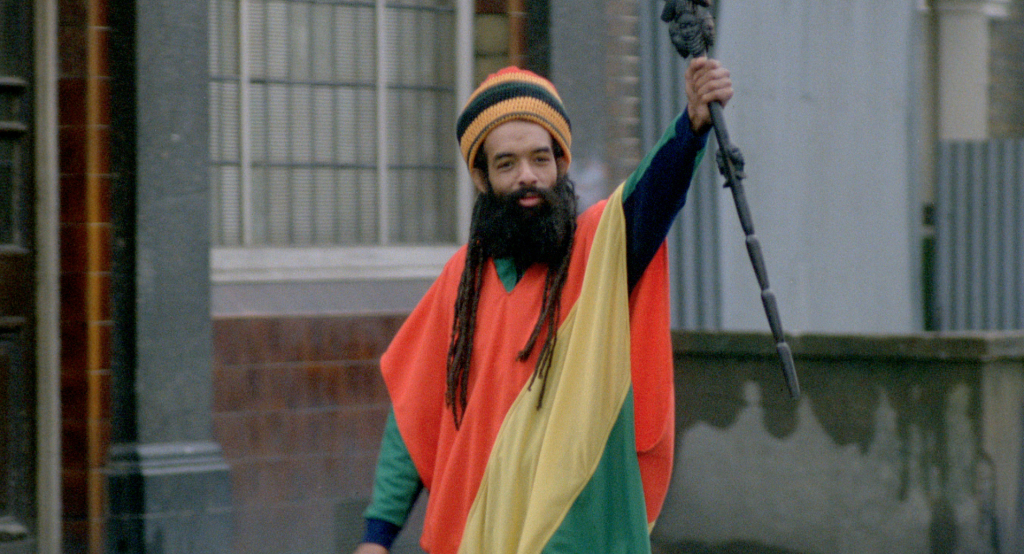40 Years of Racial Tension
Review of Babylon at Northwest Film Forum.
Written by TeenTix Newsroom Writer Leuel Bekele and edited by Teen Editor Tova Gaster.

It’s 2020, and while it’s certain that things are changing, many things have remained the same. Earlier this month I was fortunate enough to see Babylon at the Northwest Film Forum, a nonprofit film and arts center whose main purpose is to incite public dialogue and action through cinematic experiences. It’s been 40 years since this film was made, but that’s also how long it took for it to be officially released in the United States. Babylon had its world premiere at Cannes Film Festival in 1980.
Babylon is a thematically timeless film that tells it like it is. It follows Blue (Brinsley Forde), a member of the Jamaican diaspora in Brixton, South London, during the early ‘80s. Over the course of the film, he faces the harsh reality of bigotry, police brutality, and the struggles of poverty. Behind the microphone is where he finds his peace. Blue and his friends are into dancehall, a genre that’s rooted in reggae, the distinction being dancehall’s digital instrumentation and faster tempo. The ensemble prepare for a dub battle, a clash of sound and lyrics, similar to that of rap battles of Bronx, New York during the same time period.
The film got an X rating in London (a step more extreme than an R-rating), and was banned in the U.S. for “being too controversial, and likely to incite racial tension.” But the truth is the racial tension was already there, and films such as Boyz n The Hood (1991), and Do The Right Thing (1989) held the same sentiments and exposed the same issues. The title gives context to the film: Babylon is a word used among Rastafarians to refer to Western civilizations such as America, Australia, New Zealand, and Europe.

While Blue and his friends revel in their music, bigotry threatens their peace of mind. Often they’re forced to internalize their frustration because retaliation isn’t worth the consequences. For example, in one scene after a party, the group chats outside their studio when glass bottles are thrown at them along with racial slurs. Later on, they come back to the studio to find their equipment smashed up, and offensive insults across the walls. Blue walks in first and is left aghast by the sight. The rest of the group shares his grief.
Later we see Blue walk out of the studio with a screwdriver in hand, as a dancehall instrumental plays in the background. He crosses the street and walks into the complex of the bottle thrower to confront him. He knocks, and when the door opens, he's met with a barrage of insults, and domineering aggression, and with hesitation Blue stabs the man in the gut and runs.
In an interview in Vice magazine, Forde was asked about the film’s ban in the United States, and he mentioned that “the idea of the underdog fighting back is too much for some to handle. There was a great fear of what film could do alone to incite people.”
A lot has changed since Babylon came out in 1980, yet the film’s message about the violent impacts of xenophobia and white supremacy remains sharply relevant. As Forde said, “40 years later, and the similarities are striking. Yes, we’ve seen improvements in some ways, but the problems of bigotry, poverty, and class still keep us on that same treadmill.”
Babylon ran at the Northwest Film Forum January 3-5. For event information see here.
Lead photo credit: Brinsley Forde as Blue in Franco Rosso's Babylon.
The TeenTix Newsroom is a group of teen writers led by the Teen Editorial Staff. For each review, Newsroom writers work individually with a teen editor to polish their writing for publication. The Teen Editorial Staff is made up of 6 teens who curate the review portion of the TeenTix blog. More information about the Teen Editorial Staff can be found HERE.
The TeenTix Press Corps promotes critical thinking, communication, and information literacy through criticism and journalism practice for teens. For more information about the Press Corps program see HERE.

